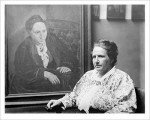BROWSING YOURSELF
If you’ve acquired the slightest degree of local notoreity or celebrity, there’s a narcissistic game available to you, courtesy of what was once, back in the ancient 1990s, quaintly called The Information Superhighway. Here’s how it works: Get on the Net. Go to your favourite search engine (e.g., Google). Enter your name (e.g., Stan Persky). Click.
Keeping in mind Ecclesiastes’ maxim that "All is vanity," you may now twiddle your Mouse finger while waiting. But you don’t have to wait very long. Since the Net aspires to be a virtual world of undelayed gratification, in a nano-second, or to be more precise, in 0.74 seconds, bingo! Google has searched 1,387,529,000 web pages and produced 874 items containing the words "Stan Persky". You are now free to wallow in yourself.
Yes, as you’ve probably already intuited, there’s a problem. Finding out about yourself on the Net turns out to be about as efficient as medieval monks in a monastery library trying to piece together the thought of a minor ancient Greek philosopher. What the monks have available to them are various fragments of the thinker’s writing that have been quoted and misquoted by subsequent writers several centuries later, and maybe a page or two of the guy’s scribbles that were tossed into the wastebasket and then recycled as packing material for a shipment of amphoras from Corinth to Olympia.
So, for example, here’s what I found out about myself in the first 10 results of Google’s search for me:
1. The Writers’ Union of Canada provides a partial, out-of-date, bibliography of books I’ve written and my date of birth.
2. A site called eye.net presents a negative review of one of my books by somebody named Edward Kay. The site and Mr. Kay are otherwise unidentified. The review is billed as "Edward Kay pans Persky’s book," and the review is short, nasty, snide, self-satisfied, poor and brutish. It’s one of those especially irritating reviews that would require a correction twice as long as the original in order to sort out its misunderstandings.
3. A blurb from the Banff Centre for the Arts mentioning my name. But when you click onto the site, it doesn’t connect, and you’re given complicated instructions for how to inform some mythical person or machine of the error.
4. Something called the Google Web Directory, which is a subsidiary of something called the Open Directory Project. It provides a list of references to "Stan Persky." The list consists of a) the Writers’ Union partial list of my books; b) an article from the rightwing whacko Alberta Report magazine attacking me for reviewing a book by a biologist in favour of evolution; and c) "Edward Kay pans Persky’s book."
5. The Open Directory Project, which contains the same items as in item 4.
6. A "Stan Persky" page from geometry.net. It consists of unidentified snippets and tidbits written by me and by others. The lead snippet is a lengthy, but unidentified quote from the now-ubiquitous Edward Kay, followed by a couple of unidentified quotes from reviews I’ve written, which geometry.net has acquired because organizations interested in the review have posted it on their websites for advertising purposes. A total mishmosh.
7. Dooneyscafe.com. This reference actually leads you to pieces of unexpurgated writing by me.
8. A friendly, 2-paragraph, amateur review of a decade-old book of mine by someone named Lisa Pretty at a site called mun.ca.
9. A site called Open Here offers two items. Yeah, you guessed it. Ed Kay pans Persky, and Alberta Report defends creationism.
10. Announcement from the Little Sister’s bookstore catalogue of a forthcoming book of mine.
The utter hit-and-miss quality of the Google search becomes more apparent if you know that in the last decade or so I’ve published 4 or 5 books which were each reviewed in a dozen or more newspapers and magazines, and about 250 articles in the Globe and Mail, The Vancouver Sun and sundry magazines, and that all of this material is available in electronic form. Moreover, I even possess that cyber-equivalent of the vanity license plate, a website homepage which contains a heap of my scribblings.
So, what’s gone wrong? Two things. First, most of the pages that contain my writings and reviews of my books are not available to the Google search program. Apparently, all the stuff that I’ve written for newspapers is held by the papers’ own electronic databases, and isn’t made available to search engines, unless somebody at another website that Google has access to has copied my article from the original source. Ditto for reviews about my books. Second, Google has its own program–a set of automated rules or algorithms–called RankOrder which searches pages and then puts them into an order for display in its search results. The details of the RankOrder program are available at the Google site, but since the explanation is written in obscure tekkie jargon, it’s easy to nod. But the details don’t help much, since the point is, the program, apart from working on an inadequate data base, doesn’t work very well.
The one thing that Google could really use, in addition to better data, is the one thing that’s not available to it, namely, a human being. What I mean is, Google needs what in pre-Net days used to be known as an "editor," a person who could, at a glance, decide that Edward Kay, for example, is a non-entity in the reviewing world, as is the site on which his review appears, and quickly relegate it to slot number 874 in the search results. But the number of editors that Google would need for such a chore is clearly fiscally unfeasible, and the term "editor" is now mainly used not in reference to human beings with particular skills of discernment but simply to describe certain computer functions.
Ideally, if you search for a particular writer, what the search ought to produce is a set of everything the writer has written that’s available in electronic form, and everything that’s been written about the writer, such as reviews of his or her books. Instead, most of what you get are bits of oddball, marginal information and, in the case of writers, lots of indirect advertising from bookstores and publishers. Most of the clicking and rummaging turns out to be a waste of time, because the computer algorithms are so far unable to distinguish between mere information and actual knowledge.
If there is going to be a search procedure via the Net (and there is), then it ought to work. I suppose, in a way, this isn’t so much a complaint as a request memo to computer programmers and search engine executives about what they ought to be working on in order to satisfy search consumers.
Oh, and in case you were wondering: No, I haven’t searched for Edward Kay in the Google glut. He just isn’t all that interesting.
August 28, 2001


